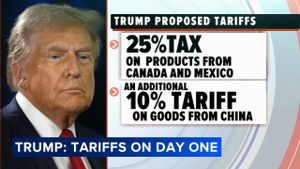President Donald Trump recently set the stage for renewed tension among the United States' largest trading partners by signing executive orders implementing significant tariffs on imports from Canada, Mexico, and China. The tariffs, set to take effect on February 4, 2023, will impose a steep 25% duty on most goods coming from both Canada and Mexico, alongside a 10% tariff on Chinese imports.
These moves come as part of Trump’s efforts to address what he describes as national emergencies associated with illegal immigration and the fentanyl crisis. Speaking on the consequences of these decisions, Trump stated, "We need to protect Americans, and it is my duty as President to..." While he claims these tariffs are necessary for national security reasons, the rapid implementation of such tariffs raises eyebrows and concerns about their broader economic impact.
Canada and Mexico have swiftly announced retaliatory actions. Canadian Prime Minister Justin Trudeau emphasized on social media, "Canada’s ready with a forceful and immediate response," indicating plans to counteract American tariffs through similar measures targeting U.S. imports. Reports suggest Canada could impose tariffs on approximately $155 billion worth of U.S. products, which may include American beer and fruits — particularly orange juice from Trump’s home state of Florida.
Mexican President Claudia Sheinbaum also confirmed via social media, "I’ve instructed my economy minister to implement the plan..." which focuses on defending Mexican interests against these tariffs. She stated the move is necessary, highlighting their willingness to seek dialogue yet asserting the need to protect their economic standing.
The raw statistics surrounding trade by country paint a compelling picture of interdependence. According to 2022 data, U.S. goods and services exported to Canada reached $356.5 billion, making Canada the leading destination for American exports. With daily trade across the U.S.-Mexico border exceeding $2.7 billion, there are significant reasons for concern about the potential ripple effects of these tariffs.
Economic experts have predicted serious repercussions from the tariffs. For example, the Yale Budget Lab estimates the changes could result in losses of approximately $1,250 annually for the average middle-class American family. Similarly, with tariffs driving up prices on goods, many economists worry about the worsening of inflation rates at home.
While the tariffs primarily affect consumers, the interconnected nature of the supply chains between the U.S., Mexico, and Canada means manufacturers will feel the impact deeply as well. Cars, electronics, and agricultural products frequently cross borders multiple times during production, meaning increased tariffs could lead to higher costs for automakers and grocery stores alike. A trade analysis indicated the average U.S. car price could rise by about $3,000 as the increased costs following the tariffs are passed on to consumers.
The reported long-term economic outcomes suggest potential for serious deterioration of trust among the trading partners involved. John Carlos Rodríguez, managing director at Cushman & Wakefield, expressed concern, saying, "Our economies are so intertwined, it would take decades to decouple," emphasizing the negative effects of such disruptive policies.
Interestingly, the tariffs could exacerbate already-high prices of everyday goods. For example, U.S. imports from Canada account for significant amounts of the fresh produce available to consumers — much of which is sourced from Mexico. Scott Lincicome, trade analyst at the Cato Institute, cautioned, "Grocery stores operate on really tiny margins. They can’t eat the tariffs..." He noted this could lead to inflated prices for essentials like avocados, just before key events like the Super Bowl.
Increasingly, economists like Lawrence Summers note the detrimental effects of tariffs will be felt not just by Americans but also trade partners, highlighting the potential for job losses and strains on manufacturing sectors. Further, as tensions escalate, China remains poised to challenge these tariffs at international forums like the World Trade Organization.
Experts call for careful deliberation before the government pushes forward with such sweeping trade policies, urging consideration of long-term relationships over quick political gains. Mark Carney, former governor of the Bank of Canada, asserted, "The actions taken today by the White House split us apart instead of bringing us together." His concerns reflect the general apprehension surrounding the U.S.-Canada relationship amid pressing trade issues.
The tariffs put forth by President Trump not only set the stage for immediate economic effects but also signal potential for lasting changes within bilateral trade relationships. The question remains: Are these steps toward addressing past grievances worth the prospective fallout, or will they lead to broader economic challenges for all parties involved?



